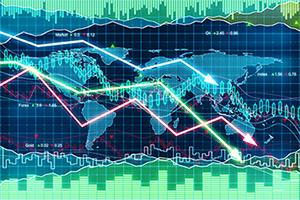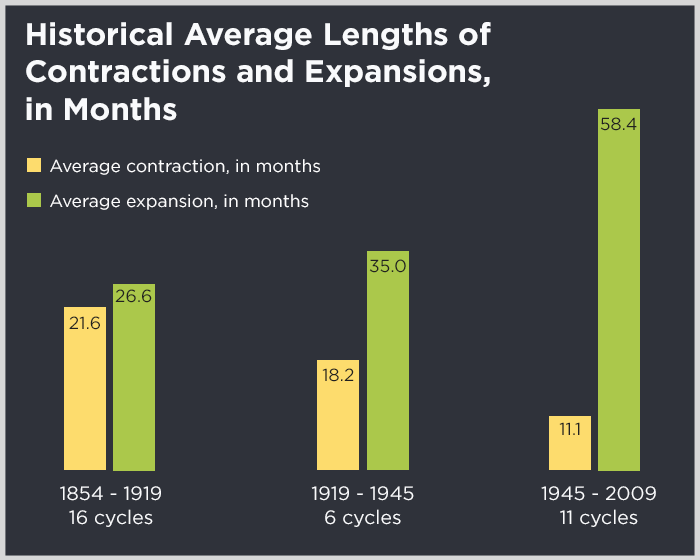 We’ve been talking a lot around the office lately about the next recession and how to prepare our clients for that eventuality. It’s part of our job at Azzad, making sure we’re looking ahead to the next big thing or market-moving event. And it’s only natural to talk about what might be ahead because we’re currently living through one of the longest economic expansions on record (120 months and counting).
We’ve been talking a lot around the office lately about the next recession and how to prepare our clients for that eventuality. It’s part of our job at Azzad, making sure we’re looking ahead to the next big thing or market-moving event. And it’s only natural to talk about what might be ahead because we’re currently living through one of the longest economic expansions on record (120 months and counting).
A recession, sometimes called a “contraction,” refers to a decline in economic activity and is a fact of life in the business world. Recessions can trigger steep declines in the stock market, which is one of the reasons we keep abreast of the health of the U.S. economy. We need to know where markets might be headed when the next recession happens, which it inevitably will. It’s not a question of “if,” but “when.”
Research shows that although there have been 11 recessions since World War II, only three of them triggered particularly severe market downturns: 1973-1975 (market decline of 48%), 2000-2001 (market decline of 49%), and 2008-2009 (market decline of 56%).
We’ve been looking at the causes of each of those recessions/bear markets, and each of them followed a unique series of circumstances in economic history. The 1973 recession was triggered by an oil embargo targeting the United States, and the 2000 and 2008 recessions were largely due to bubbles in the internet and housing sectors. Unlike the other eight recessions since WWII, each of these three events was caused by large imbalances in the economy. The majority of recessions, however, were natural slowdowns in the business cycle, and the corresponding market sell-offs were relatively less severe.

Should we assume that the next recession that comes along will be like the “normal” ones and not like the three big ones above? Some say that right now, the U.S. economy doesn’t have the same types of imbalances that led to those three outliers. If we go with the odds and take the viewpoint of the majority, the next one will probably be more like the garden variety kind we’ve seen historically. That would mean a market downturn that’s not as severe as those in recent memory.
On the other hand, the next “big one” could be just around the corner. The old saying that life is lived forward but only understood backwards might apply here, as well. Just as we’re now able to look back and pinpoint “obvious” causes to those big recessions that stand out from the rest, it may not be possible to say now what seeds are being sown for a future whopper of a recession. From excessive sovereign debt to geopolitical shocks, there are still dangers lurking out there. Investors should remain vigilant.
Either way, our job isn’t to predict the future. It’s to prepare you for the inevitability of recessions and bear markets and to make sure that your risk tolerance is in line with your asset allocation. Stocks are still one of the best ways to grow your wealth, despite temporary setbacks.
If you’re interested in making sure your plans are up to date, give us a call: 888.86.AZZAD. We’re here to help regardless of the market’s ups and downs.
Investing » Preparing for the next recession
Preparing for the next recession
A recession, sometimes called a “contraction,” refers to a decline in economic activity and is a fact of life in the business world. Recessions can trigger steep declines in the stock market, which is one of the reasons we keep abreast of the health of the U.S. economy. We need to know where markets might be headed when the next recession happens, which it inevitably will. It’s not a question of “if,” but “when.”
Research shows that although there have been 11 recessions since World War II, only three of them triggered particularly severe market downturns: 1973-1975 (market decline of 48%), 2000-2001 (market decline of 49%), and 2008-2009 (market decline of 56%).
We’ve been looking at the causes of each of those recessions/bear markets, and each of them followed a unique series of circumstances in economic history. The 1973 recession was triggered by an oil embargo targeting the United States, and the 2000 and 2008 recessions were largely due to bubbles in the internet and housing sectors. Unlike the other eight recessions since WWII, each of these three events was caused by large imbalances in the economy. The majority of recessions, however, were natural slowdowns in the business cycle, and the corresponding market sell-offs were relatively less severe.
Should we assume that the next recession that comes along will be like the “normal” ones and not like the three big ones above? Some say that right now, the U.S. economy doesn’t have the same types of imbalances that led to those three outliers. If we go with the odds and take the viewpoint of the majority, the next one will probably be more like the garden variety kind we’ve seen historically. That would mean a market downturn that’s not as severe as those in recent memory.
On the other hand, the next “big one” could be just around the corner. The old saying that life is lived forward but only understood backwards might apply here, as well. Just as we’re now able to look back and pinpoint “obvious” causes to those big recessions that stand out from the rest, it may not be possible to say now what seeds are being sown for a future whopper of a recession. From excessive sovereign debt to geopolitical shocks, there are still dangers lurking out there. Investors should remain vigilant.
Either way, our job isn’t to predict the future. It’s to prepare you for the inevitability of recessions and bear markets and to make sure that your risk tolerance is in line with your asset allocation. Stocks are still one of the best ways to grow your wealth, despite temporary setbacks.
If you’re interested in making sure your plans are up to date, give us a call: 888.86.AZZAD. We’re here to help regardless of the market’s ups and downs.
Let Us Help You Achieve Your Financial Goals Today
Quick Links
Understanding Tariffs: What They Are and Why They Matter
Understanding the New Tariffs: What Investors Need to Know
Lessons Learned While Training for a Marathon—and How They Apply to Building Financial Security
Tax Planning for Self-Employed Muslim Business Owners: What you need to know
Financial Transparency in Marriage: An Islamic Perspective
Subscribe to the Blog
Insights & Financial Education